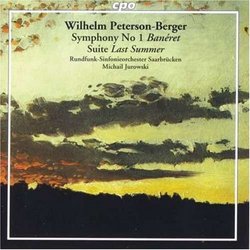| All Artists: Wilhelm Peterson-Berger, Michail Jurowski, Saarbrucken Radio Symphony Orchestra Title: Wilhelm Peterson-Berger: Symphony No. 1; "I Somras" Suite Members Wishing: 1 Total Copies: 0 Label: Cpo Records Release Date: 10/27/1998 Genre: Classical Style: Symphonies Number of Discs: 1 SwapaCD Credits: 1 UPC: 761203956128 |
Search - Wilhelm Peterson-Berger, Michail Jurowski, Saarbrucken Radio Symphony Orchestra :: Wilhelm Peterson-Berger: Symphony No. 1; "I Somras" Suite
 | Wilhelm Peterson-Berger, Michail Jurowski, Saarbrucken Radio Symphony Orchestra Wilhelm Peterson-Berger: Symphony No. 1; "I Somras" Suite Genre: Classical
|
Larger Image |
CD DetailsSimilar CDs |
CD ReviewsExcellent issue of other-than-mainstream late romantic. rumblestripca | Newmarket, Ontario Canada | 02/16/1999 (5 out of 5 stars) "A splendid release. Both the symphony and the suite stand squarely within the full-blooded romantic repetoire. In the more 'forte' passages surging, sweeping themes develop naturally and without bombast to culminate in satisfying codas. The more serene parts secure equal satisfaction with a convincing lyrical and melodic evocation of their respective titles. Indeed, both works are inherently programatic, as the composer wears his heart on his sleeve, so to speak. However, he does so with impeccable taste and refinement. Likewise, the orchestra plays to a high standard, while the recording is clear and clean with good depth and projection. So if you're looking for something in the late romantic vein outside the mainstream (eg. Berlioz, Tchaikovsky, Sibelius, etc.) try this and you won't be disappointed." Swedish Hyper-Romanticism Thomas F. Bertonneau | Oswego, NY United States | 10/23/2000 (5 out of 5 stars) "Classic Productions Osnabrück (CPO) has mined offbeat repertory for more than a decade, giving us the orchestral works of Pfitzner, symphonies by other little known Germans like Draeseke and Wetz, and exploring the late-Romantic phase of Swedish music in composers like Ture Rangström, Kurt Atterberg, and Vilhelm Peterson-Berger (1867-1942). "P.-B." (as he signed himself) translated Wagner's libretti into Swedish to facilitate performances of "The Ring" in Stockholm and Gothenburg. He wrote his own heroic opera, "Arnljot," based on the medieval Swedish saga. He embraced Nietzsche's call for "aristocatic radicalism" and dedicated himself, in hyper-Romantic fashion, to the artistic affirmation of life and nature. A man of enormous enthusiasm in everything that he undertook, a fighter for cultural renewal in Sweden in the early part of the twentieth century, we can feel his élan in the first of his eventual five symphonies, "Banéret" ("The Banner"), from 1903. It is a better first symphony than that of P.-B.'s slightly younger contemporary, Hugo Alfvén, far less academic, far more memorable in its tunes and textures, full of dash and vigor. He adds a caption to each of the four movements: 1. Allegro, un poco moderato. "Når vi först drogo ut" ("When we first took up the struggle"); 2. Allegro scherzando, non troppo moto. "Mellan feiderna" ("Between feuds"); 3. Lento doloroso. "Vid hjältebåren" ("At the hero's bier"); 4. Allegro moderato. "Mot nya vårar" ("To new beginnings"). Them's fightin' words! And P.-B. did get into more than one fight - over the low quality of orchestral performances in Sweden, over mismanagement of the Royal Opera, over the esthetic merit of contemporary Swedish music. In the First Movement, P.-B. inaugurates things easily enough but soon comes out with fists pumping: Trumpets and horns in turn "take up the cause" and propel the argument in great, good-humored surges, even through a fairly strict fugue in the development section. The Second Movement relaxes a bit, in waltz-rhythms and with touches of Grieg. The Third Movement provides the point of maximum gravity, and gives evidence of P.-B.'s admiration for Wagner. The Fourth Movement appears to a record a victory, or maybe a reconciliation among opponents; it is wholly optmistic in tone while returning to the punchy extroversion of the First Movement. We also hear P.B.'s lovely suite, "I Somras" ("Last Summer"). This disc would make a good starting-place for anyone willing to bcome acquainted with the rich symphonic tradition of Sweden."
|

 Track Listings (10) - Disc #1
Track Listings (10) - Disc #1